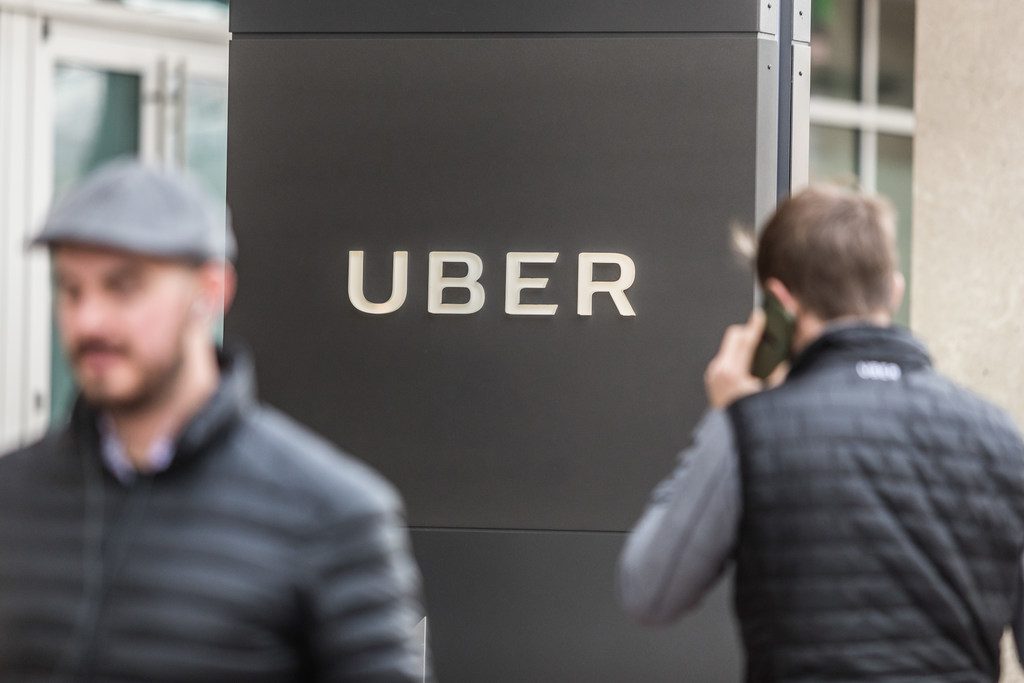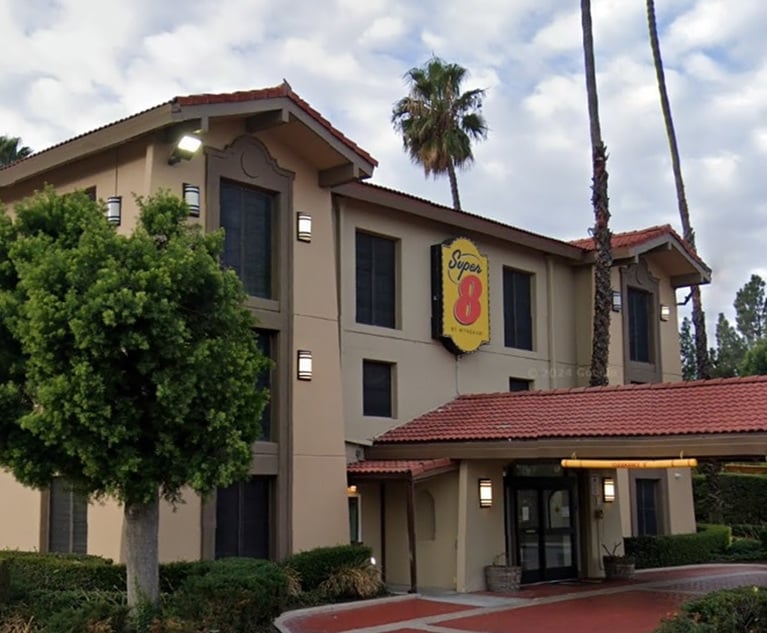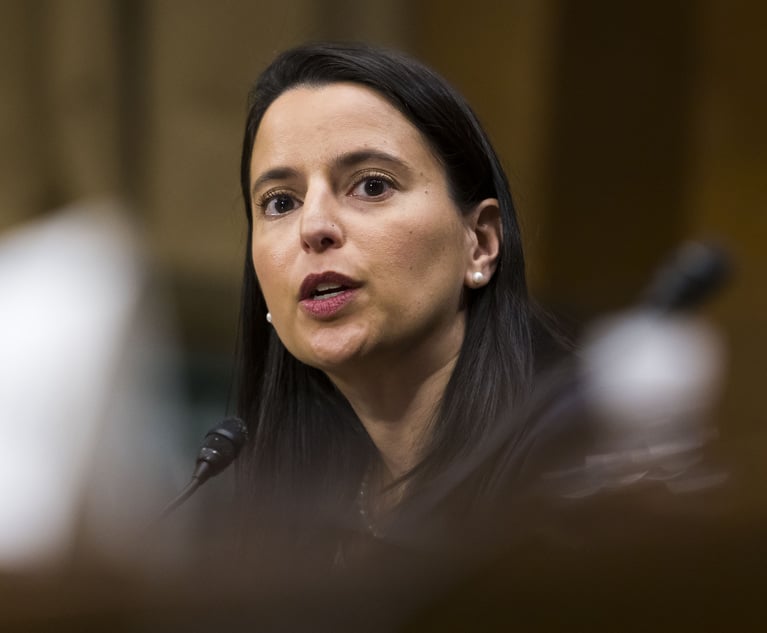Uber Agrees to Pay $10M to Settle Discrimination Class Action
In one of the first of the recent tech sector discrimination lawsuits to reach a proposed settlement, Uber Technologies has settled a discrimination and hostile work environment class action lawsuit brought on behalf of about 420 women and minority software engineers.
March 27, 2018 at 01:14 PM
3 minute read
 Photo: Jason Doiy/ALM
Photo: Jason Doiy/ALM
In what is one of the first recent tech sector discrimination lawsuits to reach a proposed settlement, Uber Technologies has agreed to pay $10 million to settle a discrimination and hostile work environment class action lawsuit brought on behalf of about 420 women and minority software engineers.
Court papers filed Monday night by plaintiffs counsel at Outten & Golden indicate that beyond the common fund payout to the class and its lawyers, Uber has agreed to reform its compensation and promotion practices for class members. If the deal is approved, Outten & Golden lawyers would monitor Uber's reforms for three years after the deal is approved.
The proposed $10 million payout includes class counsel fees, which could be as high as $3 million, a total of $80,000 in service awards for the two name plaintiffs, and a $50,000 payment under California's Private Attorneys General Act—75 percent of which will go to the state.
The proposed deal includes all women and people of color who held certain software engineering positions at the company since July 2013. The settlement requires sign-off from U.S. District Judge Yvonne Gonzalez Rogers of the Northern District of California who has been overseeing the litigation.
Uber is represented by a Paul Hastings team including Nancy Abell, who previously represented Qualcomm in a $19.5 million deal to settle gender bias claims in 2016.
An Uber spokesman noted that the settlement involves claims dating back nearly five years, and said “while we are continually improving as a company, we have proactively made a lot of changes since then.”
“In the past year alone we have implemented a new salary and equity structure based on the market, overhauled our performance review process, published our first Diversity & Inclusion report and created and delivered diversity and leadership trainings to thousands of employees globally,” the spokesman said.
Outten & Golden's Jahan Sagafi said that the plaintiffs' team was “pleased” with the result.
“We think that the monetary relief and the injunctive relief show that Uber is very serious about remedying past discrimination and harassment as well as ensuring that the employment practices and HR systems in place prevent discrimination in the future,” Sagafi said.
The tech industry has been under scrutiny for gender inequity of late, and several other major companies have faced similar lawsuits, including Alphabet Inc.'s Google and Microsoft. The U.S. Labor Department also has open investigations of the pay and hiring practices at Google and Oracle.
The Uber lawsuit, in particular, alleged Uber used a “stack ranking” system to evaluate employee performance where supervisors were required to rank employees from worst to best. The system, plaintiffs argued, set “arbitrary cutoffs” among employees with similar performance and was implemented in a way that disadvantaged female employees and employees of color.
This content has been archived. It is available through our partners, LexisNexis® and Bloomberg Law.
To view this content, please continue to their sites.
Not a Lexis Subscriber?
Subscribe Now
Not a Bloomberg Law Subscriber?
Subscribe Now
NOT FOR REPRINT
© 2025 ALM Global, LLC, All Rights Reserved. Request academic re-use from www.copyright.com. All other uses, submit a request to [email protected]. For more information visit Asset & Logo Licensing.
You Might Like
View All
Latham Adds Former Treasury Department Lawyer for Cross-Border Deal Guidance
2 minute read
Law Firms Expand Scope of Immigration Expertise Amid Blitz of Trump Orders
6 minute read
Trending Stories
- 1Public Notices/Calendars
- 2Wednesday Newspaper
- 3Decision of the Day: Qui Tam Relators Do Not Plausibly Claim Firm Avoided Tax Obligations Through Visa Applications, Circuit Finds
- 4Judicial Ethics Opinion 24-116
- 5Big Law Firms Sheppard Mullin, Morgan Lewis and Baker Botts Add Partners in Houston
Who Got The Work
J. Brugh Lower of Gibbons has entered an appearance for industrial equipment supplier Devco Corporation in a pending trademark infringement lawsuit. The suit, accusing the defendant of selling knock-off Graco products, was filed Dec. 18 in New Jersey District Court by Rivkin Radler on behalf of Graco Inc. and Graco Minnesota. The case, assigned to U.S. District Judge Zahid N. Quraishi, is 3:24-cv-11294, Graco Inc. et al v. Devco Corporation.
Who Got The Work
Rebecca Maller-Stein and Kent A. Yalowitz of Arnold & Porter Kaye Scholer have entered their appearances for Hanaco Venture Capital and its executives, Lior Prosor and David Frankel, in a pending securities lawsuit. The action, filed on Dec. 24 in New York Southern District Court by Zell, Aron & Co. on behalf of Goldeneye Advisors, accuses the defendants of negligently and fraudulently managing the plaintiff's $1 million investment. The case, assigned to U.S. District Judge Vernon S. Broderick, is 1:24-cv-09918, Goldeneye Advisors, LLC v. Hanaco Venture Capital, Ltd. et al.
Who Got The Work
Attorneys from A&O Shearman has stepped in as defense counsel for Toronto-Dominion Bank and other defendants in a pending securities class action. The suit, filed Dec. 11 in New York Southern District Court by Bleichmar Fonti & Auld, accuses the defendants of concealing the bank's 'pervasive' deficiencies in regards to its compliance with the Bank Secrecy Act and the quality of its anti-money laundering controls. The case, assigned to U.S. District Judge Arun Subramanian, is 1:24-cv-09445, Gonzalez v. The Toronto-Dominion Bank et al.
Who Got The Work
Crown Castle International, a Pennsylvania company providing shared communications infrastructure, has turned to Luke D. Wolf of Gordon Rees Scully Mansukhani to fend off a pending breach-of-contract lawsuit. The court action, filed Nov. 25 in Michigan Eastern District Court by Hooper Hathaway PC on behalf of The Town Residences LLC, accuses Crown Castle of failing to transfer approximately $30,000 in utility payments from T-Mobile in breach of a roof-top lease and assignment agreement. The case, assigned to U.S. District Judge Susan K. Declercq, is 2:24-cv-13131, The Town Residences LLC v. T-Mobile US, Inc. et al.
Who Got The Work
Wilfred P. Coronato and Daniel M. Schwartz of McCarter & English have stepped in as defense counsel to Electrolux Home Products Inc. in a pending product liability lawsuit. The court action, filed Nov. 26 in New York Eastern District Court by Poulos Lopiccolo PC and Nagel Rice LLP on behalf of David Stern, alleges that the defendant's refrigerators’ drawers and shelving repeatedly break and fall apart within months after purchase. The case, assigned to U.S. District Judge Joan M. Azrack, is 2:24-cv-08204, Stern v. Electrolux Home Products, Inc.
Featured Firms
Law Offices of Gary Martin Hays & Associates, P.C.
(470) 294-1674
Law Offices of Mark E. Salomone
(857) 444-6468
Smith & Hassler
(713) 739-1250







